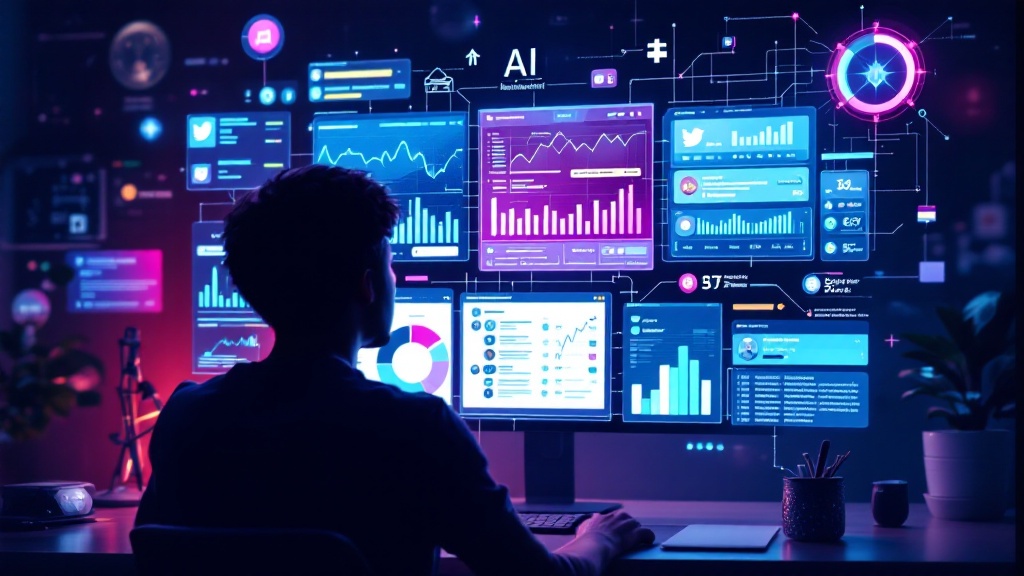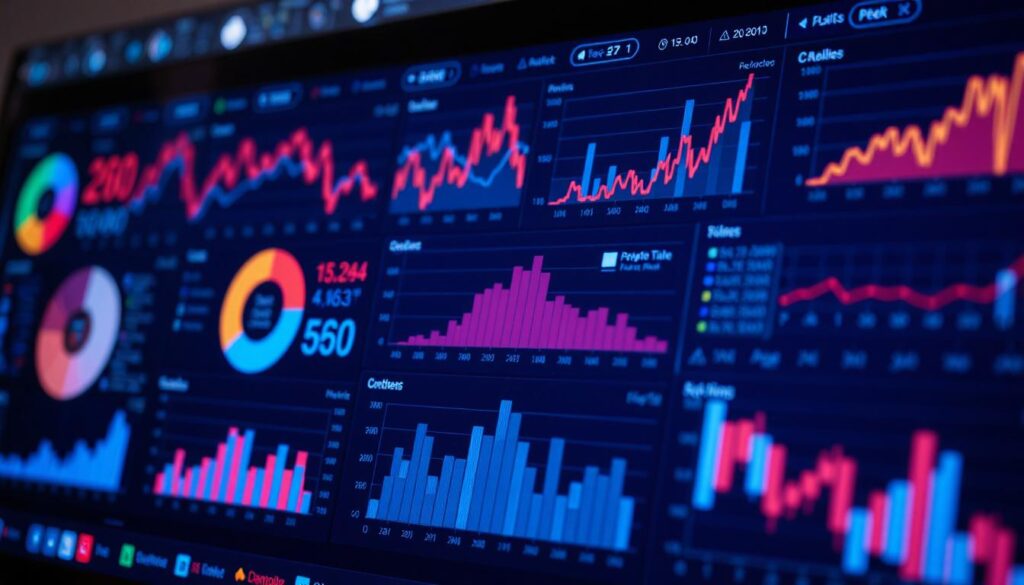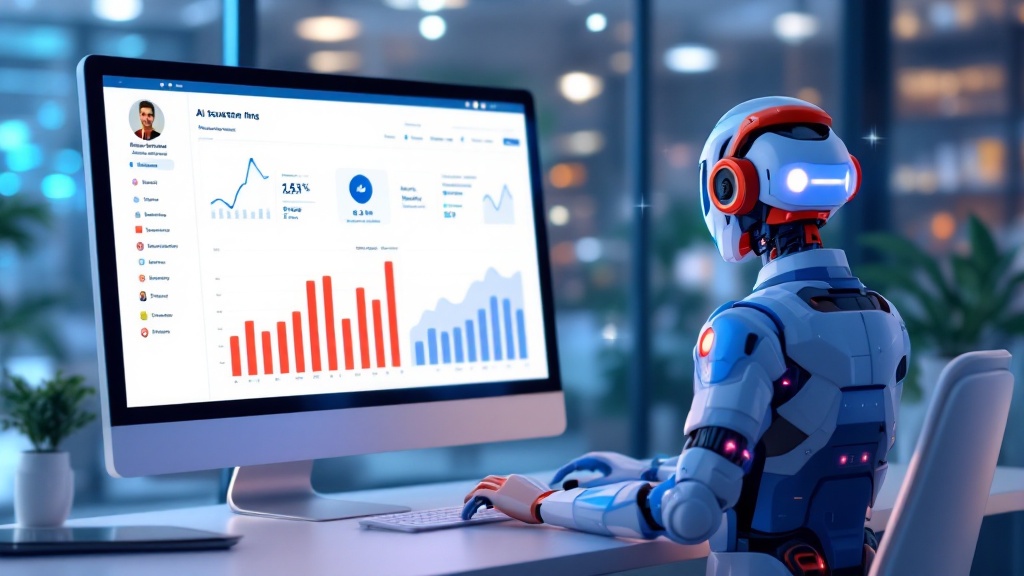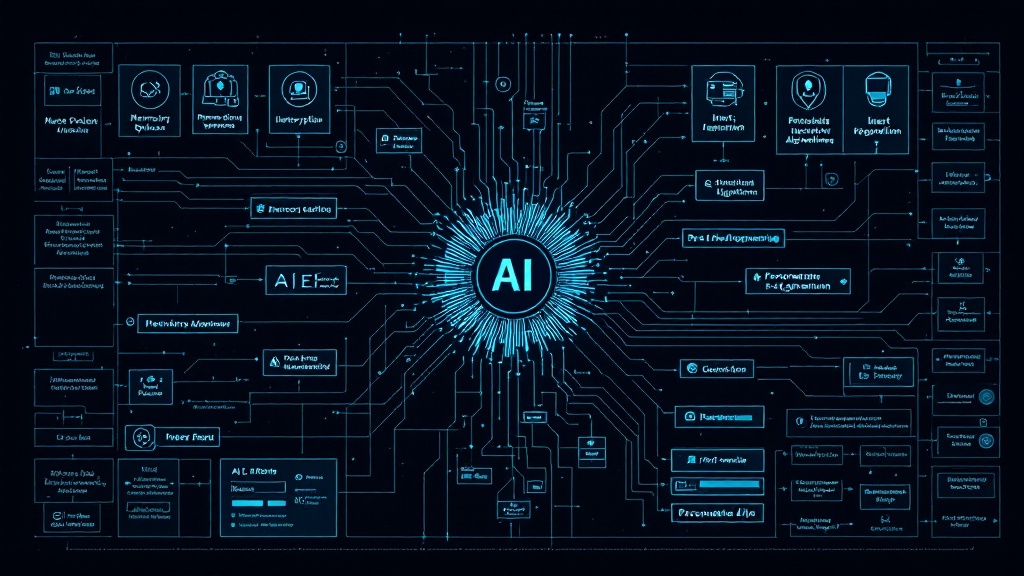Introduction
The ability to analyze and predict market trends is a crucial factor in business success. Companies that can accurately forecast industry shifts gain a significant competitive edge. Traditional market analysis methods often involve labor-intensive processes and historical data interpretation, but artificial intelligence (AI) has revolutionized this field. AI-driven tools enable businesses to extract real-time insights, detect patterns, and predict future trends with greater accuracy and efficiency.
AI-powered solutions such as machine learning analytics, natural language processing, and predictive modeling provide businesses with a deeper understanding of market dynamics. This blog explores how AI aids in market analysis and trend prediction, offering businesses innovative solutions to stay ahead of the competition.

AI-Powered Data Collection and Processing
AI automates the collection and processing of vast amounts of data from multiple sources, including social media, news articles, customer reviews, and financial reports. Unlike traditional methods that require manual data entry and sorting, AI-driven systems utilize natural language processing (NLP) to extract valuable insights quickly and efficiently.
- Real-time Data Analysis: AI tools scan the internet continuously, gathering data from various platforms to provide up-to-date market insights. This helps businesses stay informed about emerging trends as they happen, allowing for proactive strategy adjustments. Advanced AI analytics platforms like sentiment monitoring software can also assess public perception in real time.
- Sentiment Analysis: AI evaluates consumer sentiment by analyzing reviews, social media comments, and forums. By identifying positive, neutral, or negative sentiment, businesses can better understand how their products or services are perceived and refine their branding and messaging accordingly. Tools like automated customer feedback analyzers help streamline this process.
- Pattern Recognition: Machine learning algorithms identify recurring trends, such as seasonal demand fluctuations or shifts in consumer preferences. Businesses can leverage these insights for strategic decision-making, enabling them to anticipate and capitalize on market shifts. AI-powered business intelligence software can further enhance the accuracy of these predictions.
The ability of AI to analyze vast amounts of data and generate insights is explained in detail in The Science of AI-Powered Text Generation, which parallels how market trends are predicted.

Predictive Analytics for Market Trends
AI-driven predictive analytics tools analyze historical data to forecast future market trends. These algorithms recognize patterns and use statistical modeling to predict shifts in demand, price fluctuations, and emerging industry trends.
- Forecasting Consumer Demand: AI predicts which products or services will gain popularity based on past purchasing behaviors and external factors such as economic conditions, global events, and consumer sentiment. AI-powered demand forecasting software helps businesses make informed inventory decisions.
- Stock Market Predictions: AI models analyze stock market patterns, identifying potential investment opportunities and risks. Financial institutions use AI-driven predictive tools to make data-backed trading decisions, increasing efficiency and accuracy in the stock market. Advanced AI trading bots assist in real-time portfolio management.
- Competitor Analysis: AI tracks competitors’ moves, pricing strategies, and customer interactions, helping businesses anticipate industry shifts and adjust their approach accordingly. AI-powered tools also provide comparative insights, allowing companies to benchmark their performance against industry leaders. Competitive intelligence platforms automate this process for more comprehensive insights.
AI’s growing context-awareness, as discussed in AI is Becoming More Context-Aware and Emotionally Intelligent, enhances its ability to interpret complex market signals effectively.

AI in Market Segmentation and Customer Insights
Understanding target audiences is essential for businesses to tailor their marketing strategies effectively. AI helps companies segment their markets and gain deeper insights into customer behavior.
- Automated Consumer Profiling: AI categorizes consumers based on purchasing habits, preferences, and demographics. This enables businesses to create highly targeted and personalized marketing campaigns, improving customer engagement and conversion rates. AI-powered customer relationship management (CRM) software enhances these capabilities.
- Behavioral Analytics: AI tracks how customers interact with a website, social media, and other platforms to identify patterns and predict future behavior. Businesses can use this data to enhance user experience and optimize content for maximum impact. AI-driven website optimization tools assist in improving engagement.
- Dynamic Pricing Strategies: AI adjusts prices in real-time based on demand, competitor pricing, and customer willingness to pay, maximizing profitability while ensuring competitive pricing. AI-driven pricing optimization software provides businesses with automated strategies to enhance revenue.
To understand how personalized AI models can improve market prediction accuracy, see The Rise of Personalized AI How Custom GPTs Are Shaping Industries.

AI-Driven Social Media and Online Trend Analysis
Social media is a powerful indicator of market trends, and AI helps businesses analyze vast amounts of online content to identify emerging patterns.
- Hashtag and Topic Tracking: AI scans trending hashtags, keywords, and online discussions to determine the latest consumer interests. This helps businesses align their marketing campaigns with current trends. AI-powered social media monitoring tools provide detailed trend analysis.
- Influencer Impact Analysis: AI measures the effectiveness of influencer marketing by analyzing engagement levels, audience demographics, and reactions to influencer-endorsed products. This enables businesses to select the most effective influencers for brand partnerships. AI-driven influencer marketing platforms help businesses streamline collaboration.
- Crisis Detection and Management: AI detects negative sentiments or potential PR crises before they escalate, allowing businesses to respond proactively. Early detection of negative publicity helps brands mitigate reputational damage and maintain consumer trust. Automated AI reputation management tools assist in monitoring and mitigating risks.
The role of AI-powered tools in accelerating business growth and decision-making is highlighted in How AI-Powered Tools Can Help You Scale Your Business Faster, relevant to market trend applications.

AI and Business Decision-Making
AI enhances business decision-making by providing actionable insights and reducing uncertainty. Companies use AI-powered tools to optimize strategies and adapt to market changes quickly.
- Automated Reports and Dashboards: AI generates easy-to-understand reports, highlighting key trends and market predictions for executives and stakeholders. These reports allow for data-driven decision-making, reducing the reliance on intuition or guesswork. AI-powered business analytics tools streamline this reporting process.
- Supply Chain Optimization: AI predicts supply chain disruptions, helping businesses manage inventory and avoid shortages or overstocking. This ensures operational efficiency and cost savings. AI-driven logistics software enhances predictive capabilities.
- Marketing Campaign Optimization: AI analyzes campaign performance and suggests adjustments in real time, ensuring maximum ROI on marketing efforts. By continuously learning from past campaign data, AI enhances targeting precision and message effectiveness. AI-driven ad optimization tools help refine digital marketing strategies.
Exploring the integration of reinforcement learning and data scaling for smarter AI is discussed in The Power of Data Scaling in Reinforcement Learning from Human Feedback, which underpins advanced market analysis techniques.

Conclusion
AI has transformed the way businesses analyze and predict market trends. From real-time data collection to predictive analytics and customer segmentation, AI-driven tools offer unparalleled accuracy and efficiency. Companies leveraging AI for market analysis gain a competitive advantage, enabling them to make data-driven decisions and stay ahead in an ever-changing business landscape.
As AI technology continues to evolve, businesses that adopt intelligent market analysis tools will be better equipped to navigate industry shifts, anticipate consumer demands, and maintain long-term success. With the integration of AI-powered analytics, social media tracking, and automation software, companies can optimize their decision-making processes and maximize market opportunities.

Leave a Reply